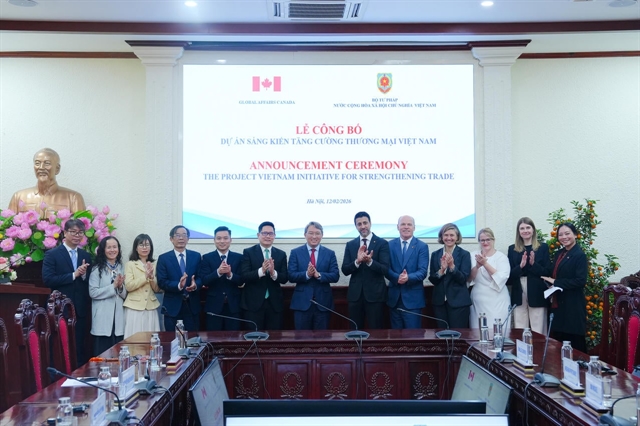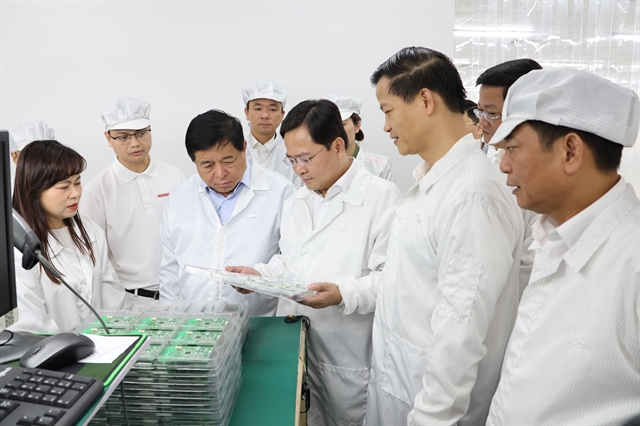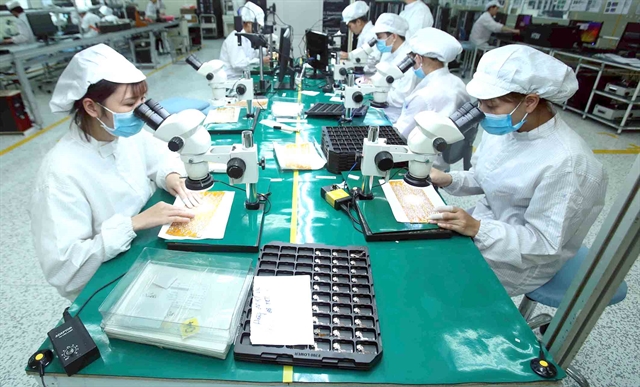 Economy
Economy

 |
| Deputy Prime Minister Nguyễn Chí Dũng (third from left) and Bắc Ninh provincial leaders visit the production line at Hanel Production, Processing and Import-Export Joint Stock Company (Hanel PT) in Tiên Sơn Industrial Park, Bắc Ninh Province. — VNA/VNS Photo |
HÀ NỘI — Entering the first half of 2025, Việt Nam’s electronics industry has continued to make an impressive mark, with export turnover exceeding US$47 billion in just the first four months.
However, behind the headline numbers lies a more complex picture, as the sector faces increasing pressure from global trade tensions, particularly the potential imposition of retaliatory tariffs by the United States on electronics, computers and semiconductor products from Việt Nam.
This context has brought to the forefront the urgent need to enhance competitiveness and reduce reliance on foreign-invested enterprises, in order to protect and sustain Việt Nam’s billion-dollar export sector.
According to the General Statistics Office, exports of computers, electronic components and equipment reached more than $29 billion in the first four months of 2025, while phones and accessories generated nearly $18 billion.
However, foreign-invested enterprises accounted for 85 per cent of the export value to the United States. In reality, domestic firms still lag behind in terms of technological capacity, financial resources and their ability to participate deeply in global supply chains.
Among local enterprises striving to assert their position, Hanel PT has emerged as a standout example. Having transitioned from a subcontracting firm into an OEM/ODM service provider, Hanel PT now oversees the entire process from design and production to quality control.
The company was recently awarded the 2025 Quality Award by Brother Group, a global name in electronic equipment manufacturing.
The deputy general director of Hanel PT, Trần Đức Tùng, remarked that international recognition such as the Brother Product Certification marks a significant turning point.
“It not only enhances our corporate reputation but also opens new doors to global customers. More importantly, it acknowledges our serious investments in technology, quality management, and international integration mindset as a Vietnamese enterprise,” he said.
In the face of trade uncertainties, many domestic firms have swiftly taken action to adapt.
Lại Hoàng Dương, general director of Thánh Gióng Communications and Computers JSC, said that his company has been actively diversifying its export markets to avoid overreliance on the US.
“Expanding into other countries helps reduce risk in the face of tariff shifts. In the long term, we are focused on improving product quality to meet the strict standards of international markets,” Dương said.
Dương added that the company is pursuing a flexible strategy, investing in R&D, upgrading technology, refining production management and optimising costs.
“We are working closely with both domestic and international authorities to stay informed on policy changes and are adjusting our production plans accordingly,” he noted.
Such proactive strategies not only help businesses maintain operational stability but also open new pathways to improve internal capabilities.
The executive committee member of the Việt Nam Electronic Industries Association (VEIA) and vice president of the Việt Nam Supporting Industries Association, Đỗ Thị Thúy Hương, emphasised that this is a critical juncture for businesses and the economy to reassess their dependence on foreign capital.
 |
| Workers operate in an electronic component manufacturing factory in Hưng Yên Province — VNA/VNS Photo |
“If we rely too heavily on external resources, we lose autonomy. We must enhance localisation, develop domestic production, improve product quality and business management to optimise costs. Only then can Vietnamese goods remain competitive across any market,” she said.
According to Hương, Việt Nam’s electronics sector should focus on three pillars for long-term resilience: investment in technology, human capital development and financial independence.
“Clearly, the US is one of the largest consumer markets globally and everyone wants to sell there. But that does not mean we put all our eggs in one basket. When we benefit from a market, of course we should sell there – but we must also learn from this and always prepare contingency plans, while managing risks in the best possible way,” she said.
On the policy front, the VEIA has proposed several measures to support enterprises and assist the Government in trade negotiations with the US.
These include enhancing supply chain transparency, committing to prevent illegal transshipments, increasing imports of US-made components to rebalance trade and introducing preferential credit and tax reductions for affected companies. — VNS




